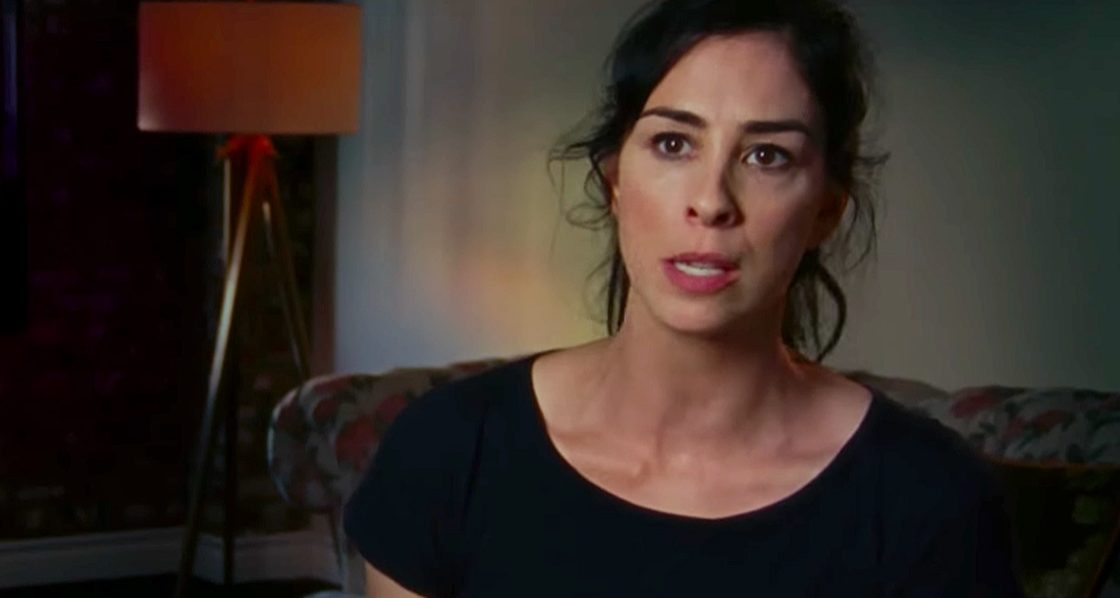 Sarah Silverman in “The Last Laugh.” Tangerine Entertainment/Journeyman Pictures
Sarah Silverman in “The Last Laugh.” Tangerine Entertainment/Journeyman Pictures Comedians — many of them Jewish — have poked fun at Adolf Hitler and the Nazi regime, even dating back to the days of the Third Reich. But is making fun of the Holocaust itself going too far?
Documentary filmmaker Ferne Pearlstein explores that question with comedians, critical thinkers and Holocaust survivors in her new film “The Last Laugh.” A special screening, along with a Q-and-A session with the director and cast members, will be held March 16 at Ahrya Fine Arts in Beverly Hills, sponsored by the Los Angeles Jewish Film Festival in cooperation with Laemmle Theatres; it opens in theaters March 17.
One of the big surprises in making the film, Pearlstein said, was that comedians draw a distinction between making jokes about Nazis and making jokes about the Holocaust.
“It’s OK to make jokes about the perpetrators. It’s not OK to make jokes about their victims,” Pearlstein said in a phone interview. “That’s the bottom line for people — for most people.”
As several comedians point out in the film, the first rule of telling a joke about the Holocaust — or AIDS or 9/11 — is that it has to be funny.
“You can’t tell a crappy joke about the biggest tragedy in the world,” says comedian Judy Gold.
Several comedians, such as Joan Rivers, do cross the line with groan-inducing jokes about Jews and ovens.
“Comedy puts light onto darkness, and darkness can’t live where there’s light,” says comedian and actress Sarah Silverman. Otherwise, she says, taboo subjects that don’t get discussed “become dangerous.”
The film opens with a quotation by Heinrich Mann: “Whoever has cried enough, laughs.” It’s followed by an image of a uniformed Nazi officer figure skating. The film then reveals the ruins of Murphy Ranch in Pacific Palisades, an abandoned camp built by Nazi sympathizers in the 1930s that becomes the improbable setting for a picnic between a Holocaust survivor, Renee Firestone, and her daughter Klara Firestone.
The older Firestone recounts meeting Dr. Josef Mengele at Auschwitz. After inspecting her mouth, he told her that if she survived the concentration camp, she should think about getting her tonsils removed.
“Most people don’t expect survivors to have much humor after the Holocaust. And that’s really not the case at all,” her daughter says. “The survivors actually have some of the worst gallows humor ever.”
The film was inspired by a thesis paper written in 1993 by Pearlstein’s friend, Kent Kirshenbaum. He gave Pearlstein the paper and told her to make it into a movie. Because the subject was so provocative, it took her and her husband, Robert Edwards, nearly two decades to find funding for it. “We kept meeting people that said, ‘Great idea! Come back when somebody else says yes,’ ” Pearlstein said.
In the meantime, Roberto Benigni’s Holocaust comedy “Life Is Beautiful” came out in 1997, and the very off-color comedy-documentary “The Aristocrats” was released in 2005, giving Pearlstein hope that a film about Holocaust humor could gain an audience. While working on another documentary about poets who survived genocide, she met a wealthy Jewish woman “with a very dark sense of humor” who wound up providing almost all the funding for “The Last Laugh” (Pearlstein said her investor has asked to remain anonymous).
The film includes interviews with major comedians, including Mel Brooks and Carl Reiner. Comedy writer Larry Charles, who directed three films starring Sacha Baron Cohen — “Borat,” “Bruno” and “The Dictator” — and many episodes of “Seinfeld,” offers his insights about what types of jokes cross the line.
The interviews are woven together with clips from films and TV shows ranging from “The Producers” and “Curb Your Enthusiasm” to Jerry Lewis’ never-released Holocaust comedy “The Day the Clown Cried.” It even has rare footage of cabarets from inside concentration camps.
In a surreal scene, Pearlstein attends a Holocaust survivors’ convention in Las Vegas and joins two of the survivors on a gondola ride through the canals of The Venetian hotel. As a gondolier serenades them in Italian, Renee Firestone and her friend Elly Gross argue about the possibility of finding humor in the Holocaust. Firestone insists that humor is an important tool for survival, while Gross has a hard time finding anything funny, 70 years after the camps.
Though the movie questions the limits of good taste, Pearlstein said it was important to treat the material in a respectful manner.
When the movie premiered at the 2016 Tribeca Film Festival, Gross was in attendance.
“In front of everybody, [Gross] talked about how much she loved the film and how tastefully she thought it was made — and could she have tickets to the next screening?” Pearlstein said. “That was my goal.”
Alan Zweibel, a veteran comedy writer and producer, said in a phone interview that gallows humor plays an important role in helping people deal with painful memories.
“We’ve got to keep alive the memory — the painful memory — that this took place, with all the deniers out there and the passing of time and the fewer and fewer survivors,” Zweibel said. “We’ve got to keep alive the fact that there was a Holocaust, and Jews deal with what everybody has been handing out to us for generations. We’ll survive, and this is how we do it.”
“The Last Laugh” screens March 16 at Ahrya Fine Arts, followed by a Q-and-A with Ferne Pearlstein, Sarah Silverman, and Renee and Klara Firestone. It opens in theaters March 17. For information, visit this story at jewishjournal.com.




















 More news and opinions than at a Shabbat dinner, right in your inbox.
More news and opinions than at a Shabbat dinner, right in your inbox.